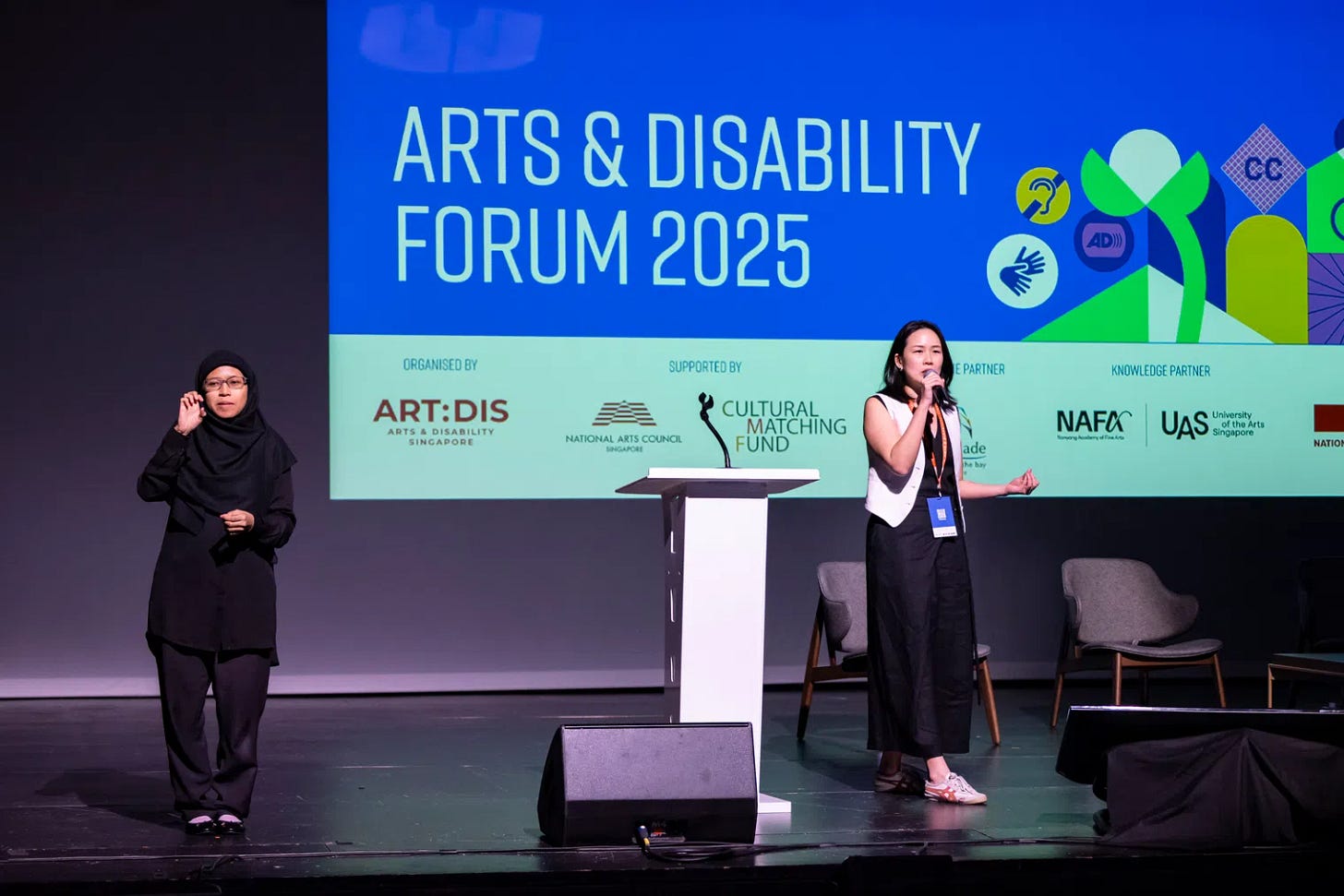Crip News v.177
ReelAbilities New York, access intimacy on Survivor 48, new works, other news, calls, and events.
NEWS
ReelAbilities New York
The ReelAbilities New York Film Festival kicks off this week, running from April 3 through 9 in venues across NYC and via a selection of streamable films and livestreamed events. In addition to the film program, this year’s schedule features a comedy night, industry summit, and more.
It’s also the first year ReelAbilities is operating under its own independent nonprofit organization, having previously worked out out of the Marlene Meyerson JCC Manhattan where it was founded in 2007. As it embarks on an ambitious 3-year strategic plan to “harness the transformative power of representation,” ReelAbilities’ increased capacity will hinge largely on partnerships and contributed income. (The festival’s ticket sales make up just 2.5% of the organization’s budget.)
Lawrence Carter-Long, longtime cultural disability activist and ReelAbilities Director of Engagement, tells Crip News that the move “allows for greater creative freedom.” As disability communities issue urgent calls against the consolidation of ableist power, Carter-Long says ReelAbilities strives “to enhance understanding, establish connections, and elevate voices that have historically and traditionally been under-resourced and undervalued.”
Access Intimacy on Survivor 48
Disability representation is not new on Survivor, one of CBS’s primetime shows and a landmark franchise in the history of US reality competition television. Popular culture that deals in eugenic contrivances often rests ableist tropes on portrayals of the ‘supercrip.’ (On Survivor, contestants’ “ultimate goal” is to “outwit, outplay and outlast” everyone else within the imperialist and colonialist gaze on the Mamanuca Islands of Fiji.)
But the 4.5 million people who tuned into last week’s episode may have witnessed a turn in how disability and access feature in a show that both draws from and limits interference between gameplay and identity politics.
Note: the following clip zooms in close on an overstimulated autistic person.
After winning a frustrating challenge for her team, Eva Erickson struggles with the composure the show expects. Eva had previously disclosed that she is autistic to another contestant, Joe Hunter, teaching him what to look for and how to respond if she goes into what she called an “episode” of being “stuck on a loop.”
In a striking moment of access intimacy, Joe offers the key element of Eva’s request in this situation: squeezing her hands tight. Eva then discloses her disability to everyone, which she has framed as intrinsic to who she is. While narrating what happened, host Jeff Probst cries on camera for the first time during what he later described in an essay for Variety as “one of the most beautiful and powerful moments I’ve ever witnessed.”
This wasn’t the first time access has appeared on the show this season. Previously, Jeff asked a different disabled cast member, Mitch Guerra, how to respond when Mitch stutters. “Give me the opportunity to finish,” he said and thanked Jeff for asking.
Are the bonds forged by disclosure and access strong enough to withstand the show’s notorious bend toward deception and betrayal? (Probably not?) The season runs until the finale on Wednesday, May 21.
New Works
Dr. Kevin Gotkin (😉) was recently on Dr. Zach Morris’s Disability Squeeze podcast talking about disability public benefits and guaranteed income.
For The Business Times, Lindsay Wong reports on the Arts and Disability Forum organized by Art:Dis that drew 450 attendees from across Asia in Singapore last week.
The Inevitable Foundation has released a report from its Adaptive Cinema Opportunity meant to push film exhibitors to identify the money it can extract from disabled people’s discretionary income through better accessibility.
In Other News…
Following the King’s July 2024 announcement of a forthcoming “Equality (Race and Disability) Bill,” the UK government issued an open consultation request for information on “how to introduce mandatory ethnicity and disability pay reporting for large employers (those with 250 or more employees).”
Several disabled artists and organizers are among the “Curious 100” list of “courageous leaders and creative minds across the United States” assembled by the Eames Institute of Infinite Curiosity.
CALLS
Access Living is calling for a show of force to combat the plan to cut 10,000 jobs at the US Department of Health and Human Services (HHS) and move an additional 10,000 roles out of the department, including those at the Administration on Community Living.
Open Style Lab is seeking people with upper limb disabilities and those who are blind/ have low vision as paid participants for upcoming events about entertainment access in-person in Culver City, CA on May 22 and NYC on May 28. Apply ASAP, as submissions close tomorrow, April 1.
EVENTS
Disability & Life Writing: A Conference
Friday, April 4, 9:30am - 5pm ET, in-person at CUNY (NYC) and on Zoom
This interdisciplinary and hybrid one-day conference will be devoted to addressing individual lives, lived experiences, and the social experiences of disability and chronic illness through all forms of life expressions.
A Disability Culture Crip Drift Day
Friday, April 4, 1 - 4pm ET, in-person in Detroit
Register now for a day of community, connection, cinema, and poetry in Core City, Detroit!
Politics of Poetics: Molly McCully Brown and Matt Bodett
Saturday, April 5, 2 - 3:30pm CT, in-person at MCA Chicago
McCully Brown reads a selection of her work including poems from her critically acclaimed debut collection, The Virginia State Colony for Epileptics and Feebleminded (Persea Books, 2017). She is joined by artist Matt Bodett—who recently published Dunning: Special Report, a book on the Cook County Asylum—to discuss a shared interest in researching psychologically and politically charged sites as sources of inspiration for new narratives and understandings of disability and mental health past and present in the United States.



